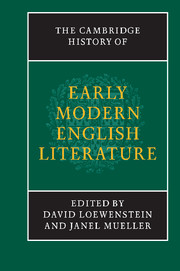Book contents
- Frontmatter
- Introduction
- 1 Modes and means of literary production, circulation and reception
- 2 The Tudor era from the Reformation to Elizabeth I
- 3 The era of Elizabeth and James VI
- 4 The earlier Stuart era
- 15 Literature and national identity
- 16 Literature and the court
- 17 Literature and the church
- 18 Literature and London
- 19 Literature and the theatre to 1660
- 20 Literature and the household
- 5 The Civil War and Commonwealth era
- Chronological outline of historical events and texts in Britain, 1528–1674, with list of selected manuscripts
- Select bibliography (primary and secondary sources)
- Index
- References
20 - Literature and the household
from 4 - The earlier Stuart era
Published online by Cambridge University Press: 28 March 2008
- Frontmatter
- Introduction
- 1 Modes and means of literary production, circulation and reception
- 2 The Tudor era from the Reformation to Elizabeth I
- 3 The era of Elizabeth and James VI
- 4 The earlier Stuart era
- 15 Literature and national identity
- 16 Literature and the court
- 17 Literature and the church
- 18 Literature and London
- 19 Literature and the theatre to 1660
- 20 Literature and the household
- 5 The Civil War and Commonwealth era
- Chronological outline of historical events and texts in Britain, 1528–1674, with list of selected manuscripts
- Select bibliography (primary and secondary sources)
- Index
- References
Summary
No doubt authors in every age have written poems and plays, stories and tracts in their studies or bedchambers. But in the late sixteenth and early seventeenth centuries, households of various kinds – from noble estates headed by literary patrons to the private dwellings of the ‘middling sort’–emerged as a prominent site of literary production for male as well as female authors, offering an alternative to the court or the church. In these years also, the activities, inhabitants and ideological underpinnings of such households form the subject matter of many kinds of literary and rhetorical texts, addressed to various audiences and serving both private and public purposes.
Ben Jonson’s ode ‘To Penshurst’ was published in his folio of 1616 but written before Prince Henry’s death on 6 November 1612. It celebrates the estate of Sir Robert Sidney, Viscount Lisle and later Earl of Leicester, younger brother of the deceased Sir Philip Sidney and of Mary Sidney Herbert, Countess of Pembroke, and himself author of a sonnet sequence, Rosis and Lysa. Jonson’s poem, in heroic couplets, presents Penshurst as an idealised noble household, a counterweight to the Jacobean court and to more recent ‘prodigy’ houses like Knole or Longleat, built for ostentatious display and to entertain the court in progress. Penshurst is a locus amoenus or delightful place with nature and human society in harmony and with pastoral otium happily associated with georgic cultivation. The woods are inhabited by nature gods and family memorials intimating permanence and stability, and on this quasi-Edenic estate fruit is ready to hand, fish leap willingly into nets, and game gladly offers itself to the lord’s table.
- Type
- Chapter
- Information
- The Cambridge History of Early Modern English Literature , pp. 603 - 630Publisher: Cambridge University PressPrint publication year: 2003
References
- 1
- Cited by



